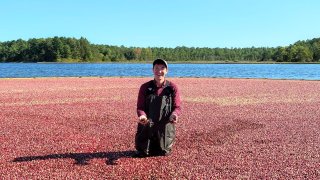
Cranberries are a Thanksgiving staple in many U.S. households — and scientists hope AI can help keep it that way.
Americans typically consume 80 million pounds of the bright red fruit around the holidays, according to the Ocean Spray agricultural cooperative. With climate change and rising temperatures already creating challenges for U.S. cranberry farmers, researchers like U.S. Department of Agriculture geneticist Dr. Jeffrey Neyhart are turning to artificial intelligence to ensure that supplies of the holiday staple remain abundant and affordable in the years to come.
"Cranberry production is challenging … [and] growers are really concerned about heat stress events," Neyhart says.
Best suited to colder environments, cranberries are a particularly sensitive crop and can be easily damaged by temperature jumps that can cause rot and other issues that result in lower crop yields, research shows. That makes cranberries one of many agricultural crops with uncertain futures, thanks to the effects of climate change.
Get top local stories in DFW delivered to you every morning. Sign up for NBC DFW's News Headlines newsletter.
Higher average temperatures already create challenges for cranberry growers across the country. While cranberry production in the U.S. is up 2% this year compared to the previous five-year average, according to the USDA, growers have already had to implement new strategies — like improving irrigation systems to counteract increased drought conditions — to keep producing more of the popular fruit.
As global temperatures rise each year, that added heat will continue to create risk for the estimated $2 billion global cranberry market — and future Thanksgiving meals.
If rising temperatures make it more difficult for cranberry growers to keep up with consumer demand in the future, then that could result in less supply and higher prices for shoppers, especially around the holidays, Neyhart notes.
Money Report
"We're trying to address the concerns of not only growers … but also processors and then, eventually, consumers," he says.
AI could help shave years off the process
Researchers like Neyhart work to identify which cranberry varieties are most resistant to extreme heat, so they can share those findings with farmers and ensure that crops are given the best chance to survive increasingly common heat waves.
The problem: It's extremely "time consuming [and] laborious." They must sort through thousands of cranberry varieties, or cultivars, to find those with the best combination of heat-resistance and quality — taking into account traits like taste, coloring, fruit yield and the ability to withstand disease — before they can try selectively breeding new varieties using the most desirable traits, Neyhart says.
"We use AI to assist us with this, because normally breeding is a numbers game," he adds. "It takes hundreds or thousands, or tens of thousands, of new offspring to screen through before we find that one or two gem strains or varieties that may make it to a grower's field."
At Neyhart's lab in Chatsworth, New Jersey, AI programs use thermal imaging to measure temperatures across canopies of countless different cranberry varieties to determine their ability to resist extreme temperatures. The programs use computer vision and image analysis to estimate crop yields, or the number and size of berries each plant produces, which would otherwise consume a lot of time and effort.
"We have to measure yield on all of these new offspring over several years," Neyhart says. "And the normal way of measuring yield is to get on our hands and knees and harvest fruit from small plots … [which] takes days."

Scientific endeavors like this one often take years to perfect. With temperatures continuing to rise each year, that means time is of the essence. Using AI to offload some of the most laborious work represents "a huge time savings that also means we can scale up and be more efficient with our resources," Neyhart adds.
Neyhart says he's been working in this role for four years and he still views his research as being in the early stages, though he adds that there have already been "promising results" suggesting that cranberry breeding will have the same success other fruit crops have had in breeding for heat resistance. Using AI technology is key to Neyhart's hope to "shave off maybe a couple of years here and there" from that process, but he also emphasizes that this is "a long term game" and the results might not bear fruit for another decade, or so.
New Jersey, where Neyhart is based, is one of the top cranberry-producing states in the U.S., though it still falls well short of the top two states, Wisconsin and Massachusetts. Those states, which are located farther north and boast colder temperatures, contribute roughly 85% of the country's total haul, according to the USDA.
"New Jersey is experiencing a greater rate of warming than other regions," Neyhart says. While that makes his research particularly of interest for local farmers, Neyhart is quick to point out that temperatures are rising everywhere, including in the northernmost states. Farmers everywhere need to be prepared.
These problems won't just affect farmers, either. Lower crop yields will mean more scarcity and higher food prices. That could put a crunch on Americans' Thanksgiving meal plans in the near future if efforts to sustain cranberry production fall short.
"What New Jersey is experiencing now might be what Wisconsin experiences in 10 [or] 20 years," Neyhart says. "It's sort of a warning. … We need to develop a solution that not only addresses the concerns of growers here, but also can be applied to other growers in other locations where they might experience this stress in the coming years."
Ready to boost your income and career? Don't miss our special Black Friday offer: 55% off all Smarter by CNBC Make It online courses. Learn how to earn passive income online, master your money, ace your job interview and salary negotiations, and become an effective communicator. Use coupon code THANKS24 to get the best deal of the season—offer valid 11/25/24 through 12/2/24.
Plus, sign up for CNBC Make It's newsletter to get tips and tricks for success at work, with money and in life.






